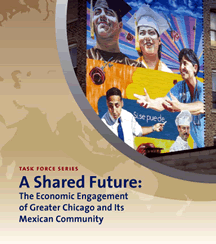
A new report published by the Chicago Council on Global Affairs, with help from the University of Notre Dames Institute for Latino Studies, says the integration ofChicagos growing Mexican community is vital to the regions economy.
TitledA Shared Future: The Economic Engagement of Greater Chicago and Its Mexican Community,the report states that Chicagos Mexicans (1.3 million according to last months U.S. Census Bureau reports), which account for 80 percent of the regions Latino population, are a robust economic catalyst for the region and are responsible for nearly 10 percent of household income, 15 percent of Illinoislabor force (as of 2004), and nearly half of the total growth in owner-occupied homes between 2000 and 2003.
Area Latino business districts are among the most successful in the region, with Latino-owned businesses posting $7.4 billion in sales in 2002, almost double their contribution five years earlier.In addition, they offerChicagoan important link toMexico, which isIllinoissecond-largest trading partner, as well as to the $2.4 trillion market in the worlds Spanish-speaking countries.
The report indicates that fully engaging Mexicans in Chicagos economic development will require overcoming language, educational and other skills challenges, and that, to accomplish this, it is necessary to strive for a comprehensive set of policies that promote the economic development, educational advancement, political and civic participation, and the health of the Mexican community in the Chicago region.
The Chicago Council on Global Affairs, founded in 1922 as The Chicago Council on Foreign Relations, is a leading independent, nonpartisan organization committed to influencing the discourse on global issues through contributions to opinion and policyformation, leadership dialogue, and public learning.
TheInstitute for Latino Studies was established in 1999 to promoteunderstanding and appreciation of the Latino experience in theUnitedStatesthrough research, education and outreach. Its areas of studyinclude Latino spirituality, art, literature, history, politics andsocioeconomic conditions.
* Contact: * Allert Brown-Gort, associate director, Institute for Latino Studies, _574-631-3787, browngort.1@nd.edu
_
TopicID: 19243